How Focusing on Link Equity Will Improve Your Link Building
Sep 18, 2023
Written by Casey Bjorkdahl

Casey Bjorkdahl is one of the pioneering thought leaders in the SEO community. In 2010, Casey co-founded Vazoola after working for a Digital Marketing Agency for five years in New York City. Vazoola is now one of the fastest growing and most widely recognized SEO marketing firms in the country.
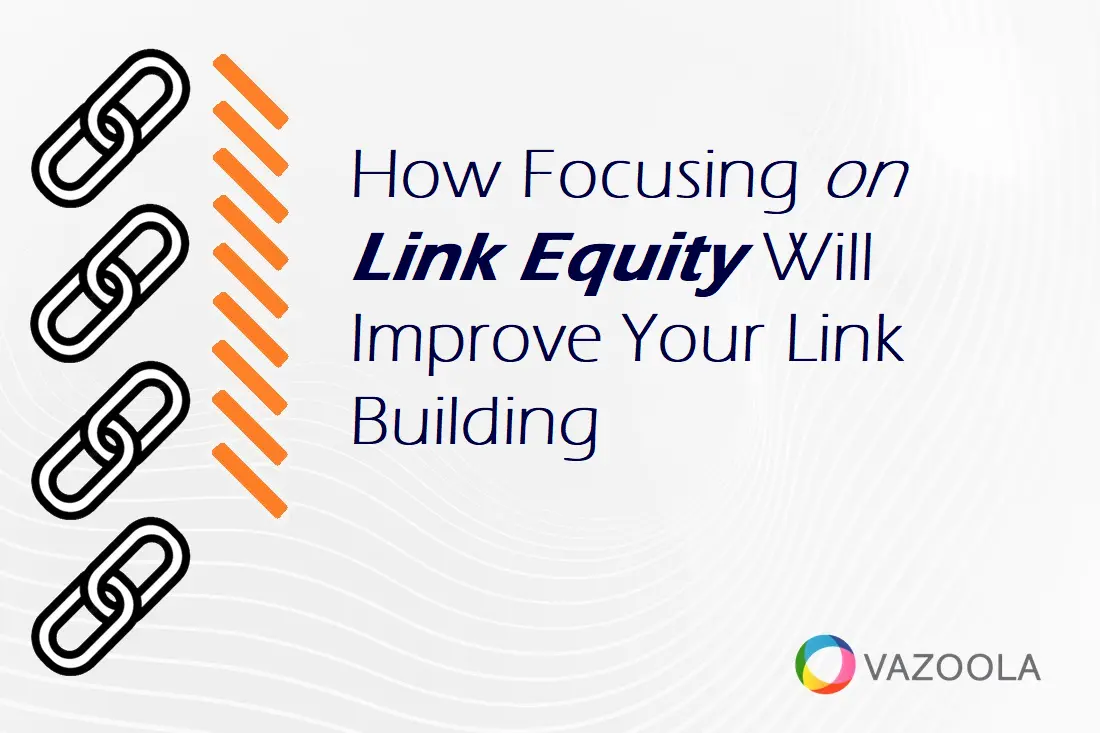
Here at Vazoola we see link equity as a concept that often is overlooked but also as one holds immense value. We are routinely educating our clients and leads on why they should be paying attention to link equity whether they are link building on their own or using a link building service like ours.
The concept of link equity or link juice, which are interchangeable terms, can significantly enhance your link-building campaigns, propelling your website's search ranking to the top.
Still, not all links contribute equally to your SEO efforts. Some links, in fact, offer no SEO value at all.
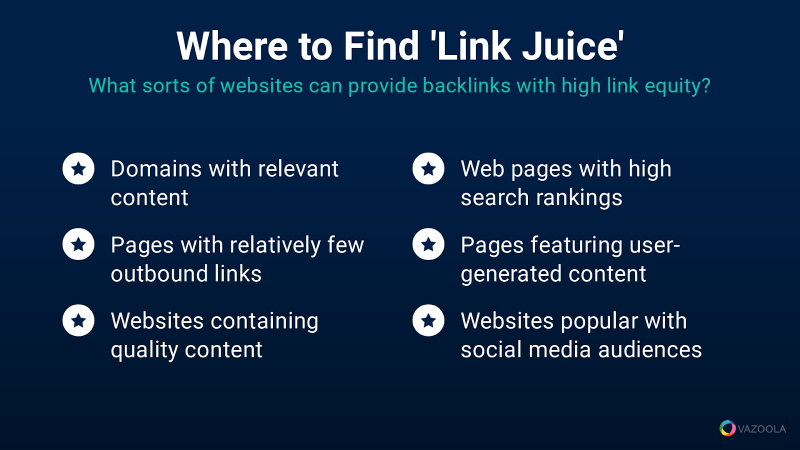
A comprehensive understanding of link juice, therefore, is an indispensable element of any broader SEO strategy.
If you've ever asked yourself, "What is link equity?" or "Why is link equity important?" keep reading for the full scoop on how to acquire link equity, and how link value strongly affects your site's SEO equity.
Are you ready to learn how link equity works?
Key Takeaways:
-
Grasping the concept of link equity is foundational for effective SEO, going beyond mere accumulation of backlinks to focus on quality, topical relevance, and authority.
-
Various elements such as relevance, quality of the referring domain, anchor text, and domain authority play pivotal roles in determining the link equity passed to your site.
-
Regular tracking and analysis of your backlink profile through specialized SEO tools are essential for understanding your current link equity status and making informed decisions.
-
Utilizing an understanding of link equity can set effective standards for link-building campaigns, whether conducted in-house or through a link-building service like Vazoola.
-
The role of link equity in SEO is evolving, with factors like E-E-A-T gaining prominence; staying ahead of these changes is key for future-proofing your SEO strategy.
Table of Contents
Understanding Link Equity SEO
Link equity plays a pivotal role in shaping effective SEO strategies.
Through years of hands-on experience, Vazoola has found that understanding the meaning of link equity often serves as a turning point for businesses, transforming their online presences and driving tangible boosts on search engine results pages.
In fact, mastery of link juice not only elevates link-building campaigns but also provides a competitive edge in the ever-evolving digital landscape.
In SEO, links are important, but the right links are vital. It's about quality, not quantity.
— Charles Floate 📈 (@Charles_SEO) May 16, 2023
A few high quality, high authority backlinks can be more beneficial than hundreds of medicore ones.
What Is Link Equity?
Exactly what is link juice in SEO?
Link equity is the value or authority that a link passes from one page to another. That value plays a pivotal role in search engine optimization, influencing how Google and other search engines rank your website.
Many have heard of PageRank, another term that floats around in the SEO world. While both PageRank—an algorithm developed by Google founders Larry Page and Sergey Brin—and link equity attempt to measure the importance of web pages, they are not identical.
Page Rank is an algorithmic measure, whereas link equity considers various factors such as the linking page authority, the relevance of the linked content, and the anchor texts used.
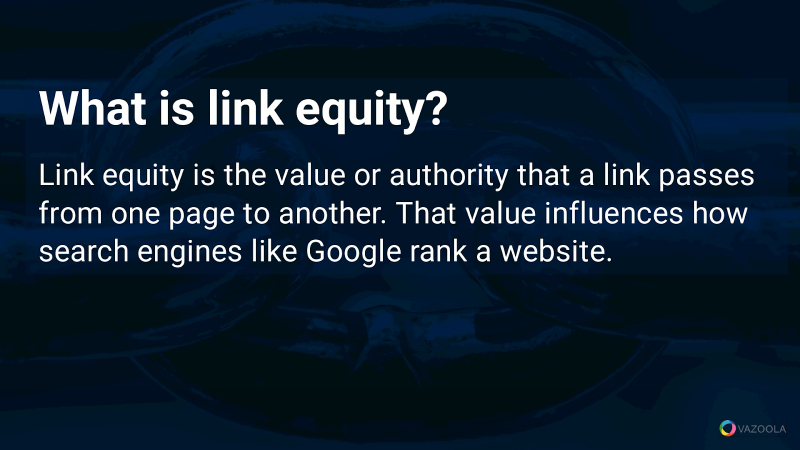
The Basics of Linking
Links can be broadly categorized into two types: internal and external links.
When it comes to outbound vs. inbound links, what’s the difference, and how do they affect equity?
Internal links connect different pages within the same website, while external links are those links pointing from one website to another.
SEO Tip:
— Will Coombe (@willcoombe) October 9, 2022
If you have a page on your site attracting quality links, internally link from that page the main pages you're hoping to rank better.
Pass that juicy link equity to the right places.
Both link types potentially can pass link juice and authority, influencing a website's search rankings.
However, internal link juice targets an entire website, ensuring that even less-visited pages get a share of the equity or link juice.
On the other hand, most links from authoritative sites can boost a site’s credibility and ranking significantly.
Our recommendation: Take a balanced approach, incorporating both internal and external links in your strategy for optimal search results.
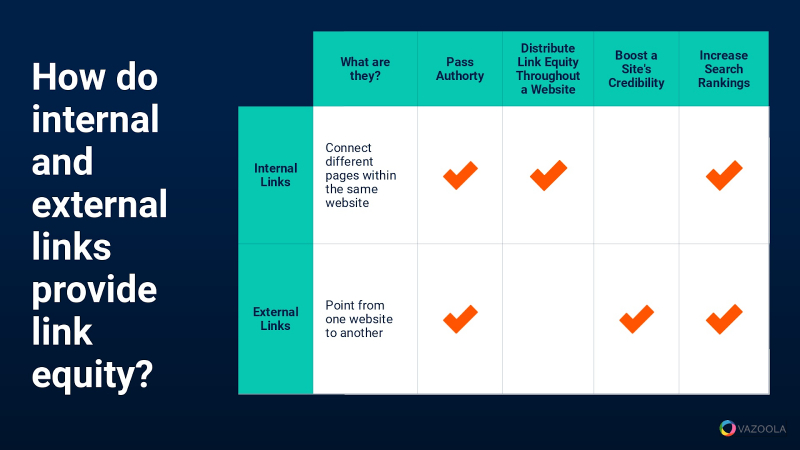
By mastering the concept of link juice and applying that knowledge in your SEO campaigns, you can make informed decisions that yield tangible benefits.
Our team at Vazoola has seen the positive impact of such an approach, and we're excited for you to experience it, too.
Factors Influencing Whether Domains Pass Link Equity
How is link equity determined? Understanding the variables that contribute to link juice is essential for optimizing a website's search engine performance.
These variables encompass everything from the relevance of the linked content to the linking page authority to the domain's Http status.
Our recommendation: A nuanced understanding of these factors can make a substantial difference in the effectiveness of SEO campaigns. If you can answer the question, "How is link equity calculated," you can develop strategies to influence how Google passes link juice to your website.
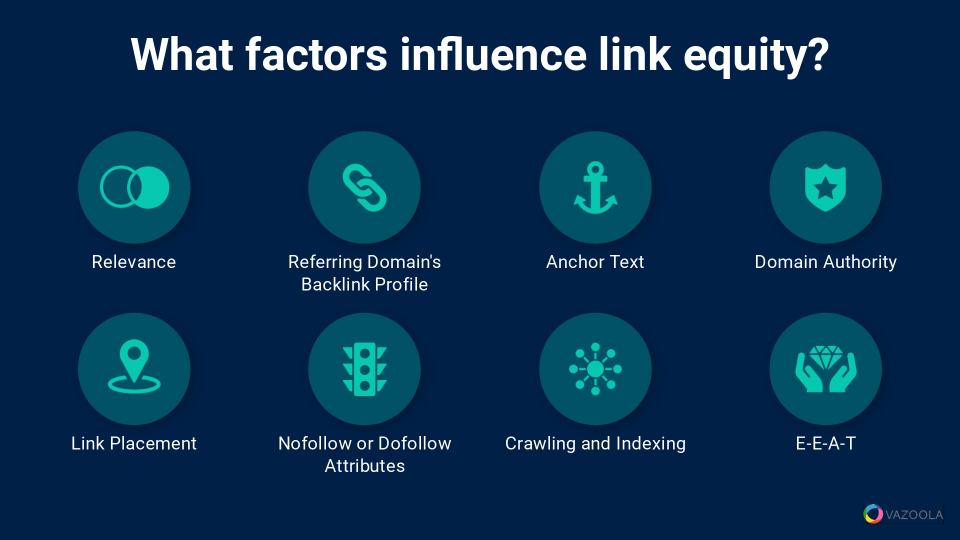
Relevance
Link relevance holds significant weight in the calculation of its equity.
A link originating from a page closely related to your own content is more likely to pass link juice. But is the link relevant?
To ascertain the relevance of a link, several factors should be considered:
-
Topic Alignment: The subject matter of both the linking page and linked pages should be closely related. A mismatch in topics can dilute the link's equity.
-
Audience Overlap: If the target audience for both pages is similar, the link is more likely to be relevant and thus pass more link equity.
-
Contextual Placement: The link should be integrated naturally within the content. A forced or awkward can diminish its value.
-
Anchor Text: The text used for the hyperlink should be directly relevant to the content on the linked page. Irrelevant anchor texts can reduce the link's effectiveness.
Pro Tips:
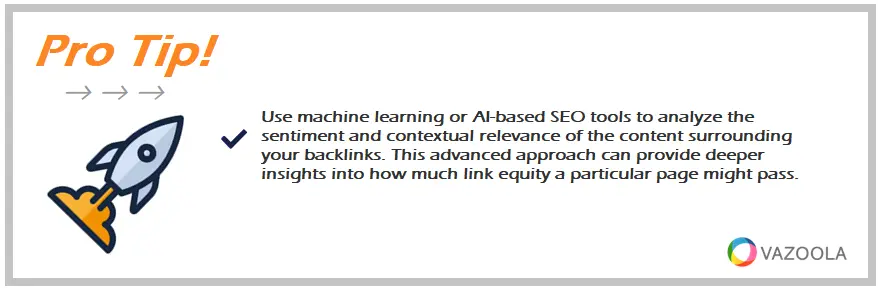
Use machine learning or AI-based SEO tools to analyze the sentiment and contextual relevance of the content surrounding your backlinks. This advanced approach can provide deeper insights into how much link equity a particular page might pass.
The Referring Domain's Backlink Profile (Quantity vs. Quality)
How many links provide the maximum link juice? Can you earn too many links?
When analyzing the backlink profile of a domain you considering getting a link from, its important to consider the number and quality of links.
A large number of low-quality or simply spamming links can have a detrimental effect on equity.
Moreover, the ratio of inbound to outbound links on a given page also can influence the degree to which is can pass link equity. A high number of outbound links can dilute the value of each individual link, reducing its impact on SEO. Here is the simple calculation that needs to be done to determine the ratio:
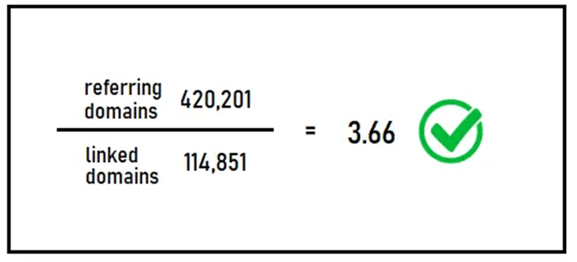
The number of referring domains (incoming) and link domains (outgoing) can be found using SEO tools like Ahrefs, SEMrush, and others. Visit this post on high quality backlinks for a walkthrough for finding and calculating this ratio.
Pro Tips:
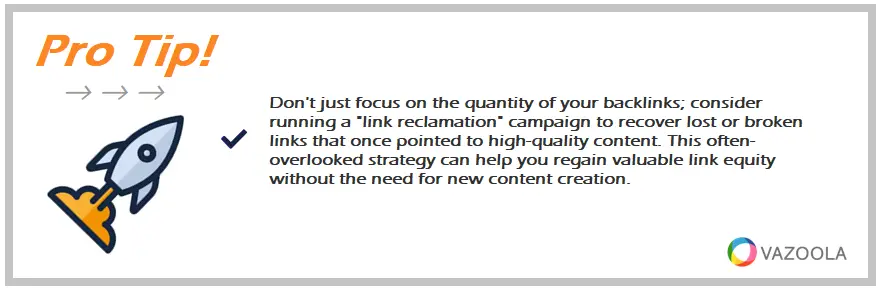
Don't just focus on the quantity of your backlinks; consider running a "link reclamation" campaign to recover lost or broken links that once pointed to high-quality content. This often-overlooked strategy can help you regain valuable link equity without the need for new content creation.
Anchor Text Optimization
The choice of anchor text—the clickable text in a hyperlink—plays a critical role in determining the link's equity.
Properly optimized anchor texts can significantly enhance the value that a link passes.
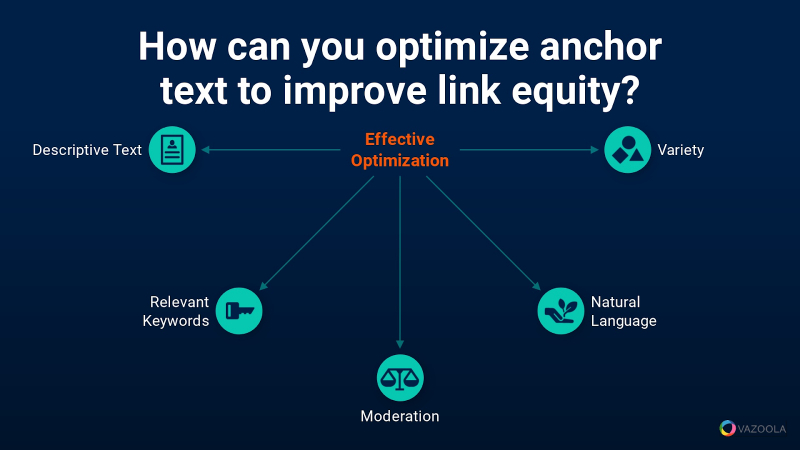
To optimize anchor text effectively, several best practices should be followed:
-
Relevant Keywords: Utilize keywords that are pertinent to the linked content. This approach not only improves the link's equity but also enhances the user experience by providing context.
-
Moderation: Over-optimization, or using the same anchor texts repeatedly, can trigger spam filters in search engines, thereby diminishing the link's equity.
-
Natural Language: Ensure that the anchor texts flow seamlessly within the context of the content. Forced or awkward phrasing can reduce the link's value.
-
Descriptive Text: The anchor texts should offer a clear indication of the content to which it links, providing both context and relevance.
-
Varied Anchor Text: Employing a variety of anchor text phrases can make the link profile appear more natural to search engines, thereby enhancing its equity.
Domain Authority
Domain authority, often calculated on a scale of 0 to 100, serves as a predictive measure of a website's ability to rank in search engines and is a significant factor in link equity distribution.
A higher domain authority score generally indicates a stronger backlink profile, making it a crucial element to consider in any link equity strategy. As an example, consider Website A, which has a strong Domain Authority score of 75. After Analyzing its backlink profile we see that Website A is receiving a lot of link juice because it is getting backlinks from many high quality domains. This means it will have more link juice to pass on to the sites it links out to, when compared to another site with a lower domain authority metric.
This would be especially true if Website A had many more websites sending it high quality backlinks than it sent backlinks out to. This is called an inbound to outbound link ratio which we'll talk about more later in this post.
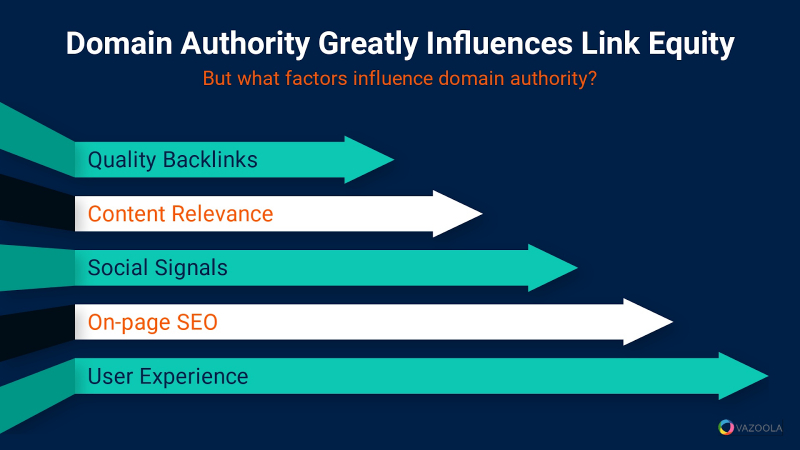
To improve a website's domain authority with a focus on link equity, you can consider these additional strategies:
-
Quality Backlinks: Acquiring backlinks from domains with higher domain authority scores than your own can significantly boost your own score. These high-quality links pass more equity, thereby improving your site's ranking potential.
-
Content Relevance: Create content worth linking to. By consistently publishing content that is both relevant and high-quality, you can attract more valuable links, thereby enhancing domain authority.
-
Social Signals: A robust social media presence can indirectly influence domain authority by driving organic traffic, which in turn can attract more high-quality links.
-
On-Page SEO: Proper on-page SEO techniques, such as keyword optimization and meta descriptions, can improve your site's visibility, thereby attracting more links.
-
User Experience: A well-designed, user-friendly website can reduce bounce rates and increase time-on-site, metrics that search engines consider when determining domain authority.
Link Placement on Pages
Link location within the content can have a substantial impact on its equity.
Generally, the first link from a domain will pass the most value, while subsequent links offer diminishing returns.
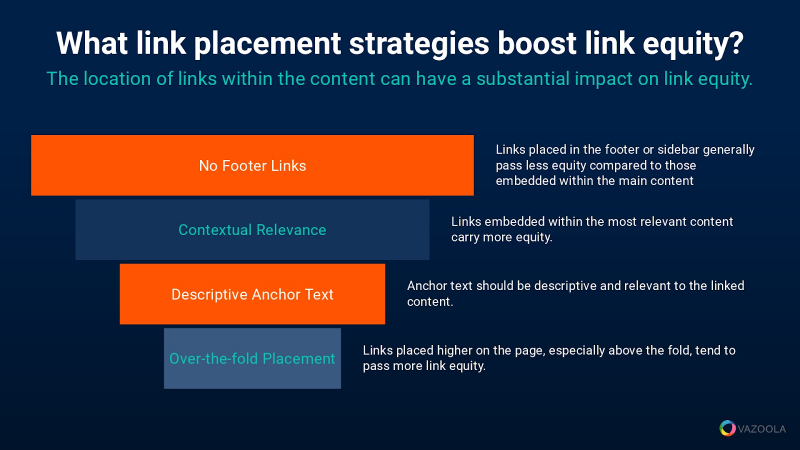
Therefore, strategic placement of links becomes crucial for maximizing their SEO impact. In the last few years we have seen a increase in popularity in our niche edits service. This is because being able to place links very intentionally into the right existing content pages has resulted in very fast improvements in rankings. To leverage this, consider the following actionable advice:
-
Prioritize Above-the-Fold Placement: Links placed higher up on the page, especially on the visible part of a page before the user scrolls down, generally pass more link juice.
-
Contextual Relevance: Contextual links are embedded in content where they are most relevant. This not only enhances user experience but also improves link equity.
-
Avoid Footer Links: Links placed in the footer or sidebar generally pass less equity compared to those embedded within the main content.
-
Use Descriptive Anchor Text: As mentioned earlier, the anchor text should be descriptive and relevant to the linked content, which can enhance the link's equity.
NoFollow Links vs. Follow Links
When it comes to SEO, nofollow and dofollow links serve distinct purposes and have different impacts on link equity.
Nofollow link attributions and their counterparts are specifically designed to tell search engines not to follow the link, thereby not passing any equity. They don’t harm SEO, they just might not help it much.
No-follow links and similar varieties often are used in comments, forums, or other areas where the credibility of the link may be in question.
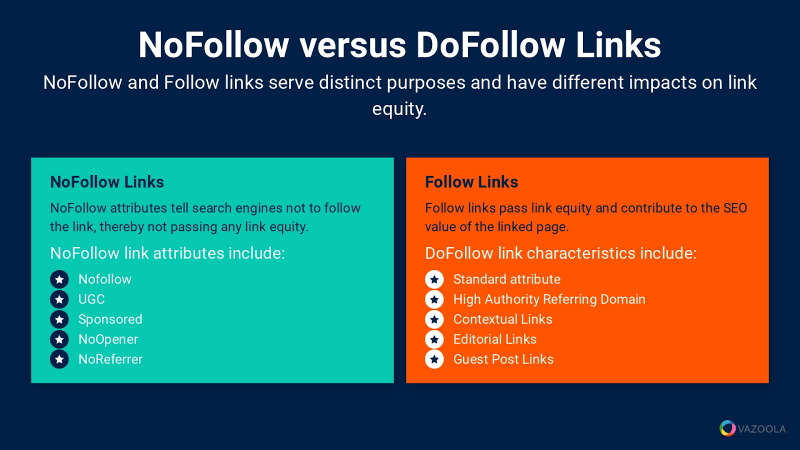
What sort of attributes should someone look for that indicate search engine’s aren’t following the link?
-
Nofollow: These links instruct search engines not to follow the link, thus not passing equity. They are often found in comments or forums where the link's credibility may be in question.
-
NoIndex: Pages or sites that are not indexed may have links on them pointing to other pages, but no link equity will be passed from those links if the page is not indexed in Google.
-
UGC: This attribute indicates that the link appears in user-generated content. Such links are generally not followed by search engines and do not pass link juice.
-
Sponsored: The attribute identifies the link as part of an advertisement or sponsorship and generally does not pass link equity.
-
NoOpener: The attribute closes a browser security issue called reverse tab nabbing, which grants an attacker partial access to the previous page. Links with the “_blank” also will be treated as noopener.
-
NoReferrer: Noreferrer relates to analytics and tracking, showing the previous page where a user came from. When a link has a noreferrer attribute, it prevents other pages from seeing the traffic that originated from the particular link.
Meanwhile, follow links are the standard links that do pass link equity and contribute to the SEO value of the linked page.
A follow link can be identified as any link that doesn’t contain the above attributes. It is associated with the characteristics including:
-
Standard Attribute: This is the default attribute for most links and is designed to pass link equity. Links with this attribute contribute significantly to the SEO value of the linked page.
-
Contextual Links: These links are embedded within the content of a page and are considered to pass more equity compared to links in footers or sidebars.
-
Editorial Links: Editorial links are given naturally by sites and other pages that want to link to your content. They pass a high amount of equity.
-
Guest Post Links: Links within guest posts contributed by either the site owner on another website are valuable, but they should be used sparingly to avoid appearing spammy to search engines.
Crawling and Indexing
The behavior of search engine crawlers significantly impacts link equity.
A well-structured internal linking strategy integrated into site architecture can facilitate the crawlers' navigation, thereby helping them understand the relative importance of each page.
This understanding thereby influences how much link equity is passed from one page to another.
If you're unsure where to begin when expanding your strategy for internal links, look for pages that include your targeted keyword using a Google search operator such as: site:vazoola.com "target keywords."
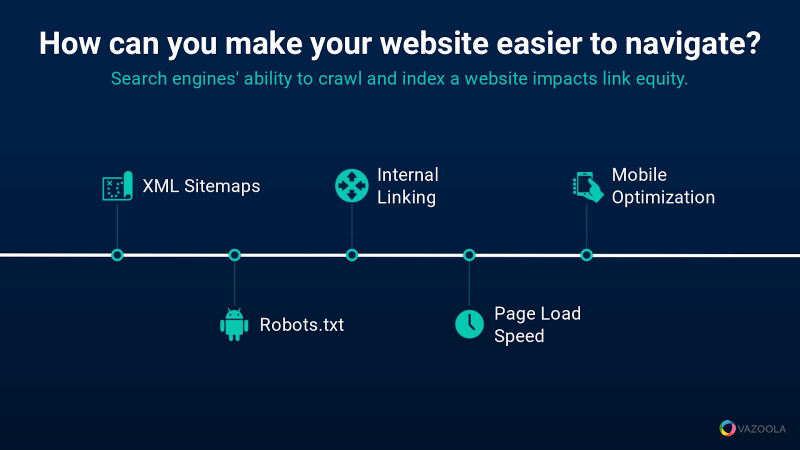
What sorts of strategies can be employed to make a website more crawlable? The following are a few tried and true methods:
-
XML Sitemaps: Submitting an XML sitemap to search engines can help crawlers find all the important pages on your site. This is crucial for ensuring that all valuable content is indexed.
-
Robots.txt: Properly configuring this file can guide crawlers to the other pages you want to be indexed, while excluding those you don't. This is especially useful for preventing the indexing of duplicate content or low-value pages.
-
Internal Linking: A coherent internal linking structure can help crawlers understand the hierarchy and importance of pages on your site. This is vital for effectively passing equity across your website.
-
Page Load Speed: Faster-loading pages are more likely to be crawled and indexed, thereby passing more link equity. Slow-loading pages can hinder the crawling process and may not be indexed as frequently.
-
Mobile Optimization: With the increasing focus on mobile-first indexing, ensuring that your site is mobile-friendly can improve its crawlability. This is essential as more users are accessing websites via mobile devices.
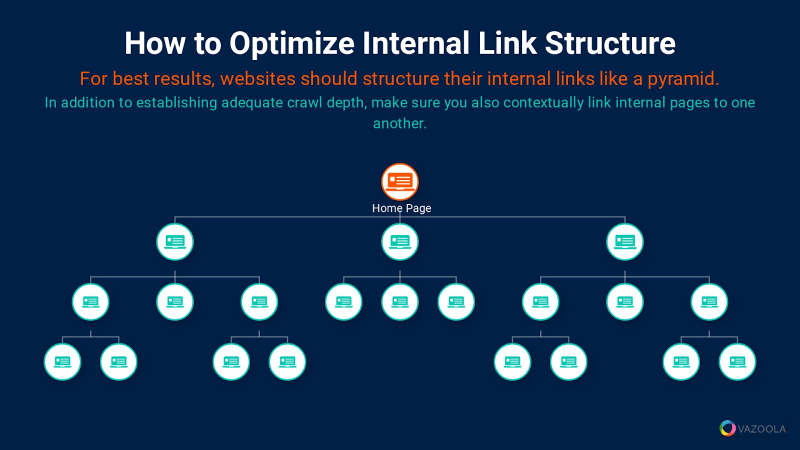
E-E-A-T of Linking Domain And Page
E-E-A-T – a website’s Experience, Expertise, Authoritativeness, and Trustworthiness – is not a direct linking factor, but it is used by Google to determine how it ranks pages.
Pages with higher E-E-A-T signals are more likely to pass greater equity with their links. Therefore, acquiring links from domains and pages with strong E-E-A-T can be beneficial for SEO.
For example, a link from a well-known medical journal would have high E-E-A-T and would pass significant link equity to a healthcare-related website.
It’s crucial, therefore, to evaluate the E-E-A-T of a linking page or domain when considering its potential impact on your site's SEO.
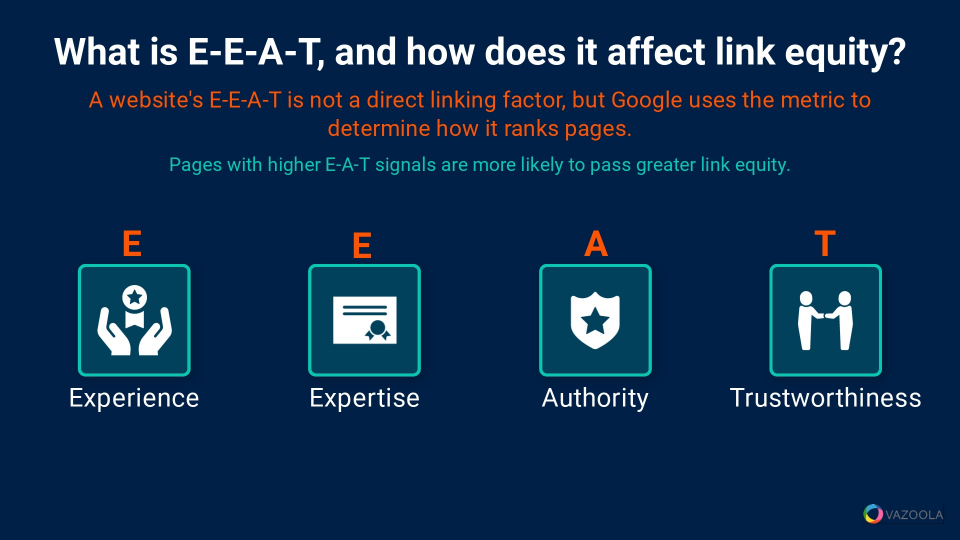
Measuring and Monitoring Link Juice
Optimizing link equity doesn’t end with the new strategies.
Measurement and monitoring are essential for improving your own or locating valuable link building targets. But where do you start?
Several factors can be monitored to measure link equity, including the authority of the referring domain, the relevance of the linked content, and the quality of the anchor text.
Regularly tracking these link metrics helps you adjust your link-building strategies, ensuring they align with your greater SEO objectives.
Pro Tips:
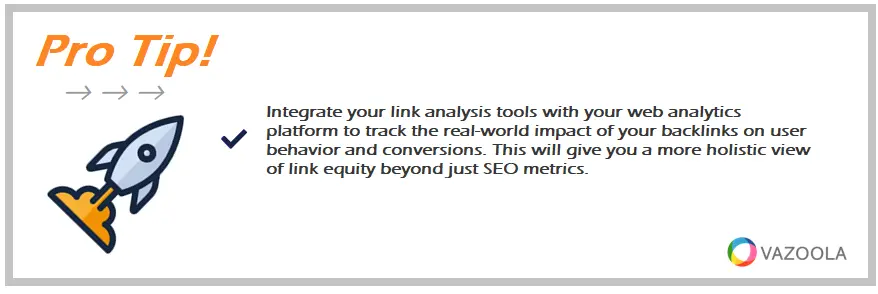
Integrate your link analysis tools with your web analytics platform to track the real-world impact of your backlinks on user behavior and conversions. This will give you a more holistic view of link equity beyond just SEO metrics.
Tools for Analyzing Internal and External Links
Before diving into the metrics, you need the right tools for link analysis.
Link analysis tools can provide invaluable insights into the quality and effectiveness of your most external links, as well as the quality of external websites directing traffic to your domain, thereby aiding in link optimization.
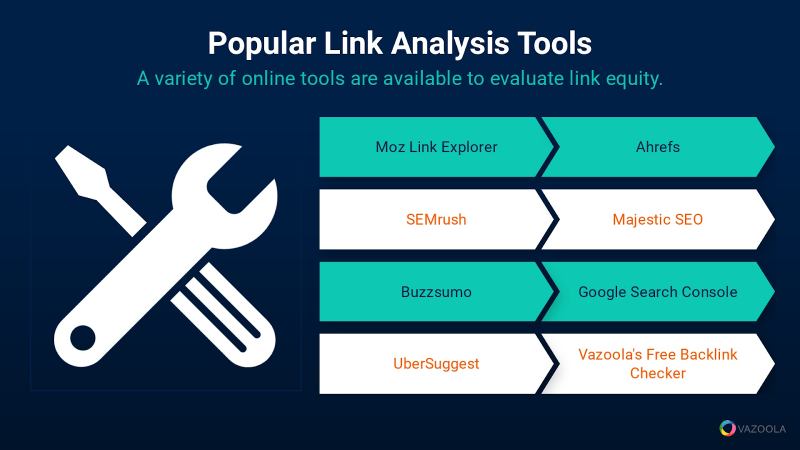
When measuring link equity, consider employing the following useful tools:
-
Moz Link Explorer: The tool offers a comprehensive look at your backlink profile, including domain authority and anchor text analysis. It's particularly useful for tracking the quality of incoming links.
-
Ahrefs: Known for its extensive backlink database, Ahrefs provides detailed insights into your link profile, helping you understand which links are passing the most equity.
-
SEMrush: This tool not only analyzes backlinks but also offers competitive analysis, allowing you to compare your link profile with that of your competitors.
-
Majestic SEO: Specializing in link analysis, Majestic SEO provides a variety of metrics, including Trust Flow and Citation Flow, to evaluate link equity.
-
BuzzSumo: While primarily a content research tool, BuzzSumo also offers backlink analysis features, making it useful for assessing the relevance of your backlinks.
-
Google Search Console: This free tool from Google provides basic insights into your link profile, including the number of referring domains and other websites linking to you.
-
Ubersuggest: Created by Neil Patel, this tool offers a range of features, including backlink analysis and domain score, to help you understand all that link juice.
-
Vazoola’s Free Backlink Checker: Our tool will allow you to view and analyze your site's list of backlinks.
Leveraging Link Equity for Link Building
Utilizing link juice effectively means setting specific requirements and standards for your link-building campaign.
Whether you're building links for your own website through tactics like competitor link building or you are partnering with a white label link builder like Vazoola, understanding the value of backlinks is crucial for achieving your goals.
At Vazoola, link equity remains a focal point of our efforts. One of our primary objectives is to understand and measure link equity, while building the most beneficial links for our clients' websites.
Pro Tips:
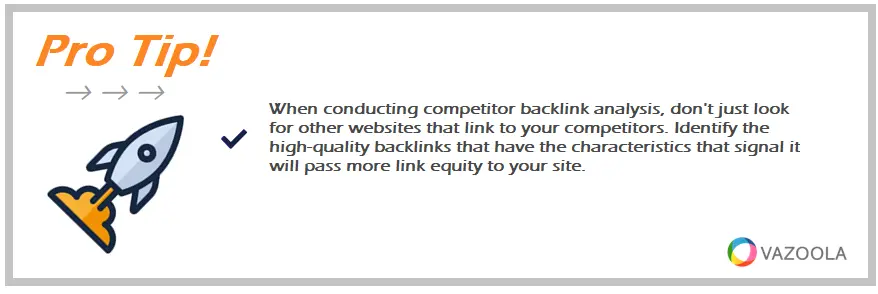
When conducting competitor backlink analysis, don't just look for other websites that link to your competitors. Identify the high-quality backlinks that have the characteristics that signal it will pass more link equity to your site.
To make the most of link juice, it's important to establish minimum values that a linking site should meet. Here are some link equity signals to consider, along with example minimum values:
-
Minimum Domain Authority: Aim for a minimum domain authority of at least 40 – but preferably 50 or higher – to ensure that the link passes a reasonable amount of equity. A domain authority below this threshold may not contribute significantly to your link equity and could be less reliable.
-
Minimum Traffic: The referring page should have a minimum of 500 monthly visitors to be considered valuable. Pages with lower traffic may not provide enough visibility or pass sufficient equity to make a meaningful impact on your SEO.
-
Do Follow Links Only: Prioritize dofollow links, as they pass link juice, unlike nofollow links. Dofollow links are essential for improving your site's search engine ranking, so make them a cornerstone of your link-building strategy. Experts recommend at least 40 to 50 backlinks to a site’s homepage, and additional internal links to each individual web page.
-
No Duplicated Referring Domains: Ensure that the links come from unique domains to avoid dilution of link equity. Multiple links from the same domain can result in diminishing returns, reducing the overall effectiveness of your efforts to build links.
-
Correct Anchor Texts: Use anchor texts that are relevant to the linked content, aiming for a variety of phrases to appear natural. For example, if your page is about "organic gardening," anchor texts like "sustainable farming" or "eco-friendly gardening" would be appropriate.
-
A Strong Inbound to Outbound Link Ratio: In order for the referring page to be considered a high quality backlink, it should have more incoming links than outgoing links to maximize the equity passed. For instance, a page with 50 incoming links and only 10 outgoing links would generally pass more equity than one with the opposite link ratio.
-
Relevance: The content of the referring page should be highly relevant to the content on your page, enhancing the link's value. For example, if your website is about pet care, a link from a well-known veterinary website with relevant pages would be valuable.
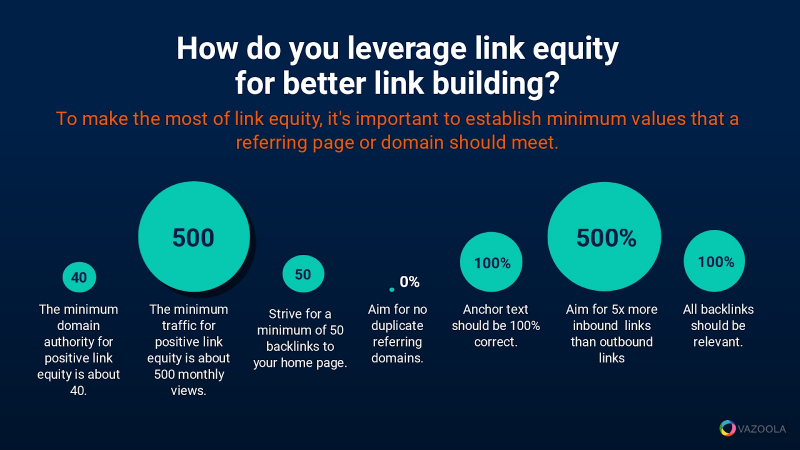
By diligently measuring, monitoring, and leveraging link equity, you can significantly enhance the effectiveness of your link-building efforts.
Our recommendation: A focused approach such as this not only improves your website's search rankings but also contributes to a more robust and credible online presence.
Link Equity in 2023 and Beyond
As the digital landscape continues to evolve, so does the concept of link equity.
In the current environment, link equity remains a pivotal factor in SEO and search engine ranks.
With search engines becoming increasingly sophisticated, the importance of link juice has not waned but has rather grown more nuanced, incorporating various other signals and metrics.
Pro Tips:
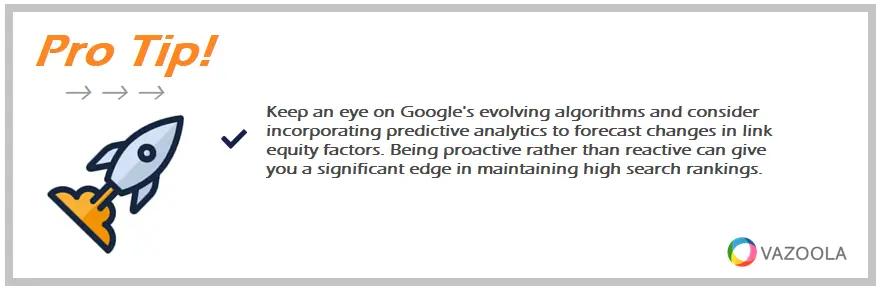
Keep an eye on Google's evolving algorithms and consider incorporating predictive analytics to forecast changes in link equity factors. Being proactive rather than reactive can give you a significant edge in maintaining high search rankings.
The Future of Link Equity
The role of link equity in SEO is expected to continue evolving, particularly as search algorithms seek more advanced in their algorithms.
One notable trend is the growing importance of E-E-A-T as a factor that can influence link juice.
As search engines strive for more accurate and reliable search results, signals beyond backlinks such as unique content and strong displays of expertise, are becoming increasingly important.
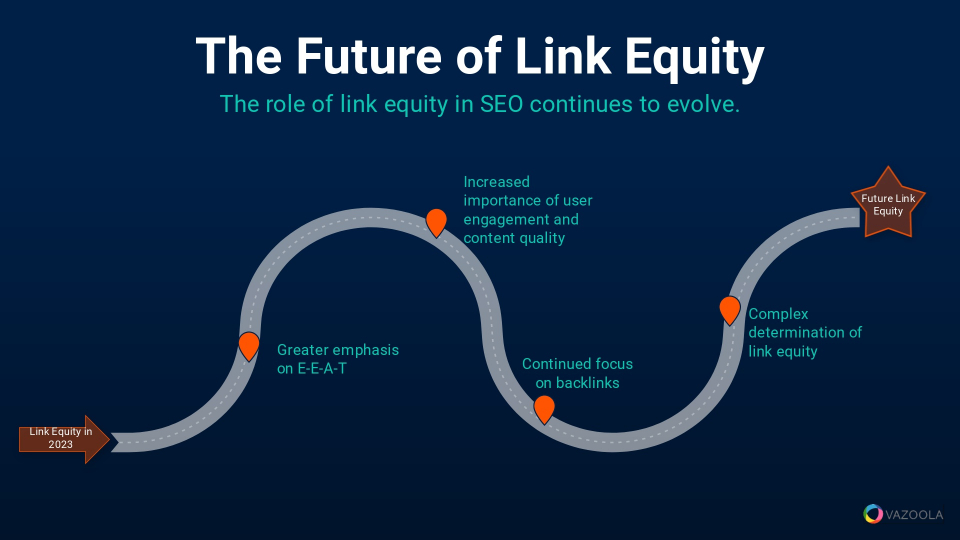
Based on these developments, it's reasonable to predict that link equity will continue to be a complex interplay of various factors, including but not limited to backlinks.
Backlinks, however, are expected to remain a foundational search engine ranking factor, with a continued emphasis on quality.
Future link-building trends may include a greater focus on acquiring links from domains with high E-E-A-T scores and an increased emphasis on user experience and engagement metrics.
Link Equity Recap
An effective understanding of what is link equity becomes a necessity for anyone who wants to excel in the competitive world of SEO.
It's far more nuanced, however, than simply accumulating a large number of backlinks. The quality, relevance, and authority of those links play a pivotal role in how search engines perceive your site.
Tools like Moz's Link Explorer, Ahrefs, and SEMrush aren't just optional; they're essential for anyone looking to get a comprehensive understanding of a website's backlink profile, its strengths, and its weaknesses.
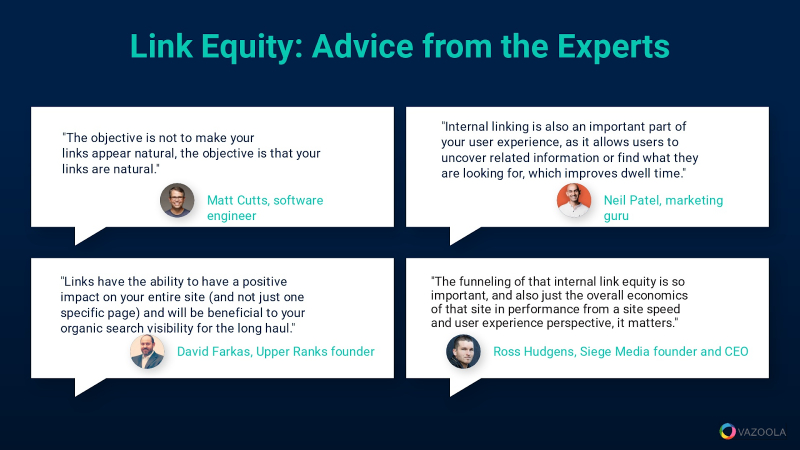
Still, don't get too comfortable. The modern SEO landscape is like shifting sand, constantly evolving. Factors like E-E-A-T—Experience, Expertise, Authoritativeness, and Trustworthiness—are gaining prominence, adding layers of complexity to how link equity is evaluated.
Likewise, a successful link equity strategy requires more than understanding the current state of affairs. The future promises even more changes, with search engines likely to incorporate even more metrics into their evaluation of link juice.
Therefore, mastering link equity is not just about optimizing for today; it's about being prepared for tomorrow, staying agile, and being ready to adapt to the ever-changing SEO environment.
Take Action for Improved Link Equity
Implementing the strategies and principles we’ve discussed can significantly improve link juice and, by extension, SEO performance.
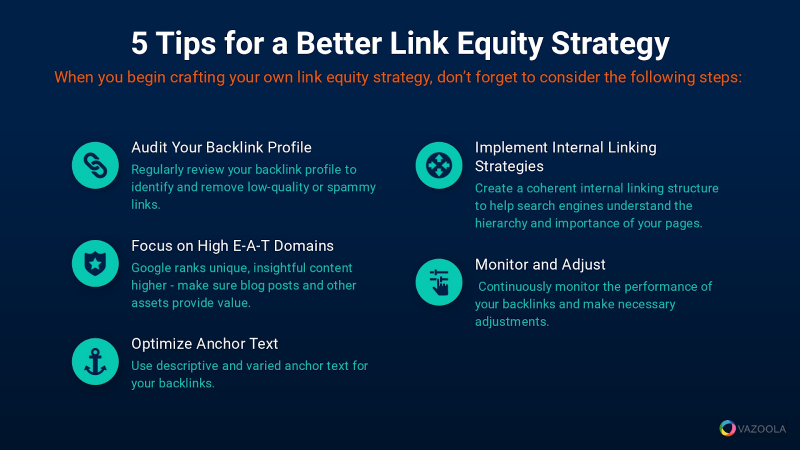
When you begin crafting your own link equity strategy, don’t forget to consider the following key steps:
-
Audit Your Backlink Profile: Regularly audit your backlink profile to identify and remove low-quality or spammy links. This proactive approach can protect your site from potential penalties and improve your link equity.
-
Focus on High E-E-A-T Domains: Aim to acquire backlinks from domains with high E-E-A-T scores. These links not only pass more link juice but also add credibility to your site.
-
Optimize Anchor Text: Use descriptive and varied anchor texts for your backlinks. This enhances the relevance of the links and can improve the equity passed to your site.
-
Implement Internal Linking Strategies: Create a coherent structure for internal text links to help search engines understand the hierarchy and importance of your pages. This can be particularly effective in passing link equity across your website.
-
Monitor and Update: Continuously monitor the performance of your backlinks and make necessary adjustments. Use SEO tools to track metrics like domain authority and traffic to ensure that your links continue to pass optimal link juice.
Our recommendation: By taking these actionable steps, you can effectively optimize link equity, thereby improving your website's search engine rankings and overall online visibility.

